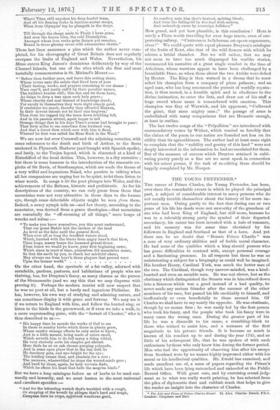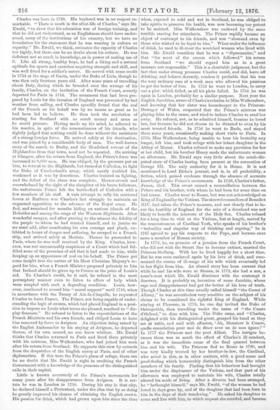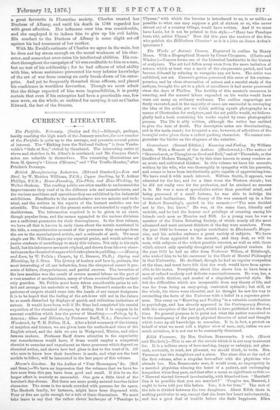THE YOUNG PRETENDER.*
THE career of Prince Charles, the Young Pretender, has been, ever since the remarkable events in which he played the principal part, a subject of considerable interest to many persons who do not usually trouble themselves about the history of far more im- portant men. Owing partly to the fact that during one or two years of his life his deeds were not unworthy of the grandson of one who had been King of England, but still more, because he was to a tolerably strong party the symbol of their departed ascendancy, his career has been invested with a halo of romance, and his memory was for some time cherished by his followers in England and Scotland as that of a hero. And yet there can be no doubt that "Bonnie Prince Charlie" was a man of very ordinary abilities and of feeble moral character. He had none of the qualities which a king should possess who has grave difficulties to contend with, except personal courage and a fascinating presence. In all respects but these he was as uninteresting a subject for a biography as could well be imagined. His brother Henry, Cardinal York, was much the better man of the two. The Cardinal, though very narrow-minded, was a kind- hearted and even an amiable man. He was not clever, but as the obstinacy which distinguished the Stuarts was in him refined down into a firmness which was a good instead of a bad quality, he never made any serious blunder after the manner of the other members of his race, but passed his life creditably to himself, and inoffensively or even beneficially to those around him. Of Charles we shall have to say nearly the opposite. He was obstinate, though by no means firm ; he was easily led by the first person who took his fancy, and the people who took his fancy were in many cases the wrong ones. During the greater part of his life he was a discredit to his cause, a stumbling-block to those who wished to assist him, and a nuisance of the first magnitude to his private friends. It is because so much is known of his conduct up to and during the year 1745, and so little of his subsequent life, that he was spoken of with such enthusiasm by those who only knew him during the former period. Men who had the opportunity of observing him after his escape from Scotland were by no means highly impressed either with his moral or his intellectual qualities. Mr. Ewald has examined, and made excellent use of, a mass of papers regarding the Prince's life which have been lying untouched and unheeded at the Public Record Office. With great care, and by exercising sound judg- ment as to what was really worth printing, he has selected from the piles of diplomatic dust and rubbish much that helps to give the reader an insight into the character of Charles.
• The Life and Times of Prince Charles !Stuart. By Alex. Charles Ewald, F.B.A- Landoll: Chapman and Hall. Charles was born in 1720. His boyhood was in no respect re- markable. " There is much in the after-life of Charles," says Mr. Ewald, "to show that his education was of foreign training, and that he did not understand, as an Englishman should have under- stood, many of the institutions of his country, but we have no foundation for the statement that he was wanting in culture or capacity." Mr. Ewald, we think, estimates the capacity of Charles too highly, but there can be no doubt about his culture. He was deficient not so much in knowledge, as in power of making use of it. Like all strong, healthy boys, he had a liking and a natural aptitude for sports and exercises requiring strength and skill, and was well fitted for a soldier's career. He served with some credit in 1734 at the siege of Gaeta, under the Duke of Liria, though he was then only fourteen years old. After some years of travelling about Italy, during which he brooded over the wrongs of his family, Charles, on the invitation of the French Court, secretly departed for Paris in 1744. The armament that had been pre- pared by Louis for the invasion of England was prevented by bad weather from sailing, and Charles speedily found that the zeal of the French on his behalf was by no means so great as he bad been led to believe. He then took the resolution of starting for Scotland with as much money and arms as he could procure. Having made up his mind, he adhered to his resolve, in spite of the remonstrances of his friends, who rightly judged that nothing could be done without the assistance of a strong foreign force. He arrived safely at his destination, and was joined by a considerable body of men. The well-known story of the march to Derby, and the ill-advised retreat of the Highlanders from that town, need not be repeated. On arriving at Glasgow, after his return from England, the Prince's force was increased to 9,000 men. He was obliged, by the pressure put on him, to retreat to the Highlands, but turned at Culloden, to fight the Duke of Cumberland's army, which nearly doubled his, weakened as it was by desertions. Charles insisted on fighting, and the defeat of the clans was complete. Horror-struck and overwhelmed by the sight of the slaughter of his brave followers, the unfortunate Prince left the battle-field of Culloden with a few members of his staff. A vain attempt to rally his scattered forces at Ruthven was Charles's last struggle to maintain an organised opposition to the advance of the Royal army. He fled, and remained for months hiding on various islands of the Hebrides and among the crags of the Western Highlands. After wonderful escapes, and after proving to the utmost the fidelity of the people to whom he had trusted himself, and in justice we we must add, after manifesting his own courage and pluck, ex- hibited in hours of danger and suffering, he escaped to a French ship, and arrived safely at Morlaix. Thence he proceeded to Paris, where he was well received by the King. Charles, how- ever, was not unreasonably suspicious of a Court which had ful- filled none of the promises of aid that it had made to him, while keeping up an appearance of zeal on his behalf. The Prince got some insight into the nature of his Most Christian Majesty's re- gard for him, when a French Minister proposed privately to him that Ireland should be given up to France as the price of Louis's aid. To Charles's credit, be it said, he refused in the moat peremptory manner even to listen to offers of help which were coupled with such a degrading condition. Louis, how- ever, continued to accord him "moral support" until 1748, when in accordance with the Treaty of Aix-la-Chapelle, he requested Charles to leave France. The Prince, not being capable of under- standing the logic of events, which had placed England in a posi- tion to impose on Louis what terms she pleased, resolved to " dis- play firmness." He refused to listen to the expostulations of the French Ministers and his own friends, and obliged Louis to have him removed by force to Avignon. An objection being raised by the English Ambassador to his staying at Avignon, he departed thence, of his own accord, no one knew whither. Mr. Ewald thinks that Charles returned to Paris and lived there privately with his mistress, Miss Walkenshaw, who had joined him soon after his return from Scotland. He supports this view by extracts from the despatches of the English envoy at Paris, and of other diplomatists. If this were the Prince's place of refuge, there can be no doubt that Mr. Ewald is right in crediting the French 4;overnment with a knowledge of the presence of the distinguished exile in their capital.
Little is known accurately of the Prince's movements for many years after his disappearance from Avignon. It is cer- tain he was in London in 1750. During his stay in that city, he declared himself a Protestant, under the idea that by so doing he greatly improved his chance of obtaining the English crown. His passion for drink, which had grown upon him since the time
when, exposed to cold and wet in Scotland, he was obliged to take spirits to preserve his health, was now becoming too potent to be resisted. Miss Walkenshaw was enslaved by the same terrible craving for stimulants. The Prince rapidly became an object of contempt to his friends, and was "shunned even by those who wished to be loyal to him." When under the influence of drink, he used to ill-treat the wretched woman who lived with him. Mr. Ewald considers that he was a "dipsomaniac," and that "for most of the events which followed" his return from Scotland " we should regard him as in a great measure not responsible." This is a charitable judgment, but the fact that under strong pressure. Charles could, and did, leave off drinking, and behave decently, renders it probable that his was the very ordinary case of a weak .man who allowed his passions to get the better of him. In 1752 he went to London, to carry out a plot, which failed, as all his plots failed. In 1754 he was again in London, probably for a similar purpose. Next year the English Jacobites, aware of Charles's relation to Miss Walkenshaw, and knowing that her sister was housekeeper to the Princess- Dowager of Wales, suspected that the Prince's mistress was playing false to the cause, and tried to induce Charles to send her away. He refused, not, as he admitted himself, because he loved her, but because he did not choose to be dictated to even by his most trusted friends. In 1756 he went to Basle, and stayed there some years, occasionally making short visits to Paris. In 1760, Miss 1alkenshaw, being unable to bear his brutality any longer, left him, and took refuge with her infant daughter in the Abbey of Meaux. Charles refused to make any provision for her or her child, but his brother Henry made the unfortunate woman an allowance. Mr. Ewald says very little about the much-dis- puted story of Charles having been present at the coronation of George III. The only authority for it is Hume. It is not mentioned in Lord Elcho's journal, and is, in all probability, a fiction, which gained credence through the absence of accurate knowledge of the Prince's movements. In 1766, Charles's father, James, died. This event caused a reconciliation between the Prince and his brother, with whom he had been for some time on bad terms. Charles went to Rome, but was not acknowledged as King of England by the Vatican. The shrewd counsellors of Benedict XIV. bad taken the Prince's measure, and saw clearly that to in- cur the hostility of England for the sake of a drunkard was not likely to benefit the interests of the Holy See. Charles refused for a long time to visit at the Vatican, but at length, moved by the remonstrances of Cardinal York, who speaks of his brother's " indocility and singular way of thinking and arguing," he in 1767 agreed to pay his respects to the Pope, and became once more a member of Roman society.
In 1772, he, on promise of a pension from the French Court, who did not wish the Stuart line to become extinct, married the Princess Stolberg. With her he lived happily for a short time. But he was soon enslaved again by his love of drink, and com- menced the course of ill-usage of his wife which eventually led to her flight from him. An absurd story has been current that while he and his wife were at Sienna, in 1772, she had a son, a mare's-nest which Mr. Ewald dismisses with the contempt it deserves. It is probably an, invention of some Jacobite, whose rage and disappointment had got the better of his love of truth. Though Charles at this time usually called himself "the Count of Albany," he was nevertheless very sensitive on the subject of his claims to be considered the rightful King of England. While staying at Florence, in 1776, he one day invited the Duke of Ostrogothia, then travelling under the name of "the Comte d'Oeland," to dine with him. The Duke came, and "Charles, delighted with his distinguished guest, grasped his hand as they sat at table, and said with effusion, Ah, Monsieur le Comte, quelle consolation pour moi de diner avec un de mes dgaux I' " In 1777 the Princess met the poet Alfieri. The intrigue be- tween them was as much the effect of Charles's ill-conduct, as it was the immediate cause of the final quarrel between him and his wife. The Princess fled to Rome in 1780, and was very kindly treated by her brother-in-law, the Cardinal, who acted in this, as in other matters, with a good-sense and good-feeling which honourably distinguish him from the other members of his family. Finding that his behaviour had brought him under the displeasure of the- Vatican, and that part of his allowance was employed to maintain his wife, Charles totally altered his mode of living. After a divorce had been arranged, he " bethought himself," says Mr. Ewald, " of the woman he had loved in days gone by, and of the daughter that had been born to him in the days of their wandering." He asked his daughter to come and live with him, to which request she acceded, and became a great favourite in Florentine society. Charles created her Duchess of Albany, and until his death in 1788 regarded her with great affection. Her influence over him was considerable, and she employed it to induce him to give up his evil habits. His conduct to the Duchess of Albany is some slight set-off against his bad treatment of her mother.
With Mr. Ewald's estimate of Charles we agree in the main, but he does not lay stress enough on the moral weakness of his char- acter, and somewhat over-rates his intellectual abilities. His con- duct throughout the campaign of '45 was creditable to him as a man, but no test of his soldiership ; for he had officers of tried ability with him, whose assistance prevented his very inferior knowledge of the art of war from causing an early break-down of his enter- prise. And yet he frequently thwarted these officers, and placed his confidence in worthless favourites. Though we must admit that the things expected of him were impossibilities, it is pretty certain that even if his enterprise had been a practicable one, few men were, on the whole, so unfitted for carrying it out as Charles Edward, the last of the Stuarts.




































 Previous page
Previous page